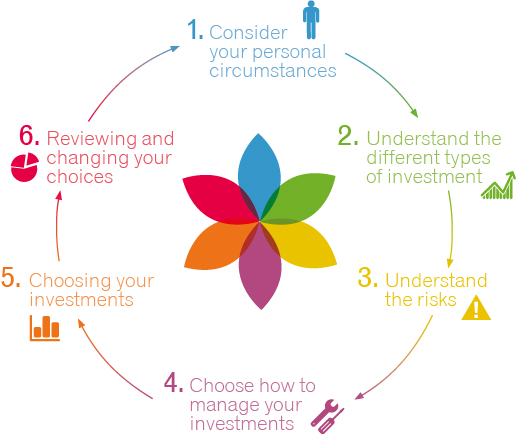Contributions are paid into a savings account which is invested in one or more investment funds from the range available to you. Your investment decisions are important as the performance of the funds in which you invest will directly affect how much money you will have for your retirement.
The Plan offers a range of funds which provide access to different types of investment (asset classes) and different investment approaches (active or passive management - see below).
Active management - actively managed funds have an investment manager who uses skill and expertise to choose investments which aim to beat the returns of a specific index or aim to achieve a long-term target. There's a risk that an actively managed fund may produce returns that are lower than the index or long-term target. The charges associated with an actively managed fund are usually higher than those of passively managed funds, because of the manager's active involvement and skill.
Passive management - passively managed funds are often called 'indexed' or 'tracker' funds. The investment manager aims to produce a return that is in line with a specific index, such as the FTSE All Share Index. The returns are usually slightly lower than the return in the index due to the effect of charges. Charges for passive funds are generally lower than those of actively managed funds as passive managers do not need to spend time researching the companies in which they invest.
The Plan is designed to provide benefits for you when you retire, and you can also provide for your family and dependants when you due. These benefits will depend on the value of your retirement savings which will in turn depend on:
- how much is paid into your retirement savings;
- when you want to retire
- how you invest your savings and the returns achieved on your investments, as shown in the following diagram:
There are six simple steps to help you choose the right investments.

Your personal circumstances
The first step is to consider your personal circumstances. To do this you need to think about the following:
- what age are you now?
- when do you plan to retire?
- will you have any other sources of income in retirement?
- how much can you afford to contribute now?
- what is your attitude to risk?
- how much control you want in how your savings are invested?
- how much have you saved so far in this, and other, pension plans?
- how you intend to take your retirement savings (e.g. as cash, income drawdown, an annuity or a combination of all three).
The different types of investments
The second step is to understand the different types of investment (or asset classes). These can be summarised as follows:
Cash
This type of fund invests mainly in short term deposits with major banks and other financial institutions. Investments in cash funds tend to be very safe and would only be at risk of falling exceptional market conditions.
Bonds
Bonds are loans to bodies such as companies (corporate bonds) or the UK government (also known as gilts). Bonds pay interest to investors, and the total return from a bond will depend on the interest rate set when the bond was first issued, and prevailing interest rates. Bond are generally perceived as lower risk than investments such as equities,(as they don't tend to move up and down in value as much as the short-term).
Equities
Equities are shares in companies, which are usually traded on stock markets around the world. Their value rises and falls according to demand, which is normally related to company growth, profits and economic conditions. In addition to changes in the share price, returns are dependent on dividends paid by the companies to their shareholders. Returns from overseas equities are also subject to fluctuations in exchange rates.
Diversified funds
Some funds (such as the Plan's Diversified Assets - Active Fund) may invest in other types of assets. These can include property, commodities, various types of debt or derivatives which can be used by fund managers to 'hedge' their position in order to reduce their level of risk.
Specialist funds
Some funds provide access to specific investment strategy such as the Plan's Shariah - Passive Fund, which provides access to a faith-compliant investment approach.